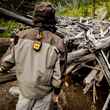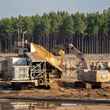Yesterday, the Biden administration rejected the “speculative” Amber Road Project that would have constructed an industrial-grade road some 210 miles into the Alaskan interior in order to allow minerals to be transported to market from the Ambler Mining District.
The U.S. Bureau of Land Management released its final supplemental environmental analysis for the road project, which would connect the mining district to the Dalton Highway. The Dalton Highway parallels the Alaskan oil pipeline across the Arctic to Dead Horse. The BLM’s analysis declared that allowing the construction to move forward would “significantly and irrevocably impact resources, including those supporting important subsistence uses, in ways that cannot be adequately mitigated.”
Officially, the BLM chose the “no action” alternative in its analysis, and, if finalized in the Record of Decision, it would deny access to the road corridor to the Alaska Industrial Development and Export Authority, the entity that proposed the road’s construction.
The road project earned preliminary permits from the Trump administration, but it was among the first mining and energy production projects approved by Trump but put on pause when President Joe Biden took office in January 2021. By denying the project, Haaland said, Interior is demonstrating “our commitment to ensure that places too special to develop remain intact for the communities and species that rely on them. There is no question, using the best available science and incorporating Indigenous knowledge practiced over millennia, that [rejection of the Ambler Road project] will help biological, cultural, historic and subsistence resources, safeguarding the way of life for the Indigenous people who have called this special place home since time immemorial.”
The Amber Road would have been a “spur” off the Dalton Highway and stretched 210 miles west along the southern slope of the fabled Brooks Range. The road would have bisected the bottom corner of Gates of the Arctic National Park and Preserve and crossed over 11 major rivers and more than 3,000 streams, many of them home to Arctic grayling, northern pike, whitefish and, in some tributaries of the Yukon River system, king and chum salmon.
The road would have been constructed to handle round-the-clock use by heavy, industrial-grade ore trucks, and it would have required some 40 gravel mines to produce the needed road base. And, because the road would have been constructed atop permafrost, it would have required constant maintenance to ensure it was safe and navigable.
Importantly, however, there are no active mines in the Ambler Mining District, and there are no mining proposals or mining permits in the district, essentially making the Ambler Road a “road to nowhere.” The idea, of course, would be to first carve access to the district through the interior and then have mining companies pay to access the road once mining activity started.
While conservation groups and some Indigenous communities are celebrating the denial of the road project, the AIDEA and Alaska Gov. Mike Dunleavy are not pleased about the administration's blanket rejection.
"Announcing the denial of the Ambler Road adds insult to injury,” Dunleavy said. “It shows just how out of touch the Biden administration is with Alaska. This potential decision not only contradicts the law, but blatantly ignores the stringent environmental stewardship we uphold in Alaska. To hinder access to our responsibly managed resources and then force America to import minerals from countries with questionable environmental practices is not just ironic—it's irresponsible and unacceptable."
U.S. Sen. Lisa Murkowski had a similar message, and accused Biden of using the Ambler Road proposal to try and shore up his young, left-leaning voting base leading up to the November rematch with Trump.
“The Biden administration may be focused on short-term political gains, but at the expense of Alaska’s long-term future, limiting jobs for Alaskans, revenues for our state, and the future energy and mineral security of our nation, Murkowski said.
The conservation group The Sierra Club was quick to support the Ambler Road denial, after working for years to achieve this outcome.
“The Ambler Road would have caused significant harm to Alaskan landscapes and the local communities and wildlife that rely on them,” said Dan Ritzman, the club’s conservation director. “The industrial corridor would have cut through the migration route of the Western Arctic Caribou Herd, causing irreversible declines in the herd. Communities along the proposed route of the road made their voices clear in opposing this damaging project, and the Biden Administration was correct to listen to them.”
The BLM will issue a Record of Decision no sooner than 30 days from the publication of the Final Supplemental EIS in the Federal Register.































Comments
TC replied on Permalink
Would love someone to explain to me why we shouldn't responsibly (economically and ecologically) mine in America but are fine outsourcing to places like Afghanistan and the Democratic Republic of Congo who use slave labor with next to no environmental protections. The actions of the Biden Administration demonstrate this is their sentiment . Since there are no calls for reducing rare earth mineral usage, it goes to show turning a blind eye is fine as long as its in the third world.
Pages